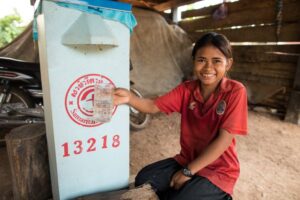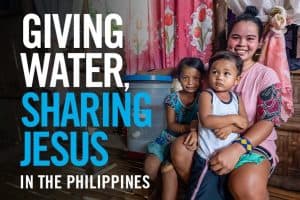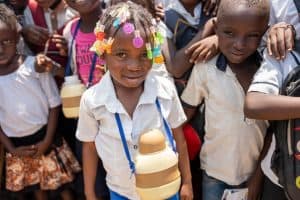Donations from Canadians have enabled Samaritan’s Purse and its partner organization in Nepal to significantly improve the lives of people in a remote village in the eastern flatlands, near India.
The approximately 60 farming families who live in Singol used to have to walk for a while to gain access to the nearest water source—a pipeline in the region. Then they’d have to carry the heavy plastic buckets home again.
“It would take much of each morning for me,” Ashma Bhujel recalls.
Worse than the daily inconvenience was the fact the water the young mother and her neighbors brought home was dirty. Singol’s residents were plagued by diarrhea that sapped their village’s productivity and created unnecessary expenses. It stopped parents from working in their fields, and children from attending school. It also forced residents to spend money on medical treatment.
When Samaritan’s Purse Canada’s partner organization learned of the villagers’ plight, it encouraged them to form a local team, then provided “Community Leadership Transformation” training to help team members become servant-hearted leaders to oversee various community improvements.
The first improvement: donations from Canadians like you helped drill a 105-meter borehole well and install a water storage tank, pump, and underground pipeline network so each home in Singol has its own tap, plus a metering system to ensure everyone pays their fair share to maintain the water system.
“In the past, we used to have diarrhea and dysentery often,” says Ashma’s neighbor, Mohan Rai, who lives with his wife and two sons, plus his parents. “But now it has stopped because of this safe water.”
The next improvement: Samaritan’s Purse Canada’s donors helped our partner organization join the Nepalese government in building latrines for each of Singol’s families. But not just any latrines—these ones capture human waste, mix it with the farm animals’ waste, and transform it into methane gas.
The gas is stored in small underground tanks at each home—a convenient energy source for cooking that means Ashma and her neighbors are no longer forced to spend more much-needed hours each day cutting and burning firewood to cook their meals.
Ashma simply turns on the valve to her methane storage tank and lights the burner on her cooking stove. She smiles while demonstrating this amazing new bio-friendly household convenience that was unheard of for Nepal’s poor only two years ago.
The government of Nepal is committed to building enough latrines to eliminate the environmentally hazardous, developing-world practice of “open defecation” by 2020. The “bio-gas” system in Singol is serving as a model for the entire country.
“Their living here standard has gone up,” says Bhab Gahle, who has managed the partnership in Singol on behalf of Samaritan’s Purse and its partner organization.
“We have a spirit now of building our community,” said local leadership team member Bhim Subba. He noted the water system and methane systems have also been attracting more residents to Singol. Several new homes are under construction, and that has longtime residents feeling excited and proud.
With the training they received, leadership team members are continuing to implement more improvements. They’ve replaced the muddy path into Singol with a gravel road. And they’re building a church, with almost every resident sharing the cost although only a small portion of them are Christians (just as only a small portion—1.4 per cent—of Nepal’s 26 million residents are Christians).
“I’m not a Christian, but I’m still happy to help build this church,” one community leader said, while welcoming Samaritan’s Purse staff inside the partially finished structure. “We didn’t know you before, but we have been blessed by you. We want to honor you and your God.”
Bhab says he’s not aware of any other community in all of Nepal where Christians and non-Christians are joining together to build a church. What Samaritan’s Purse and its Nepalese partner have achieved in Singol in Jesus’ Name is giving local Christians credibility in their village and surrounding region, he adds.




